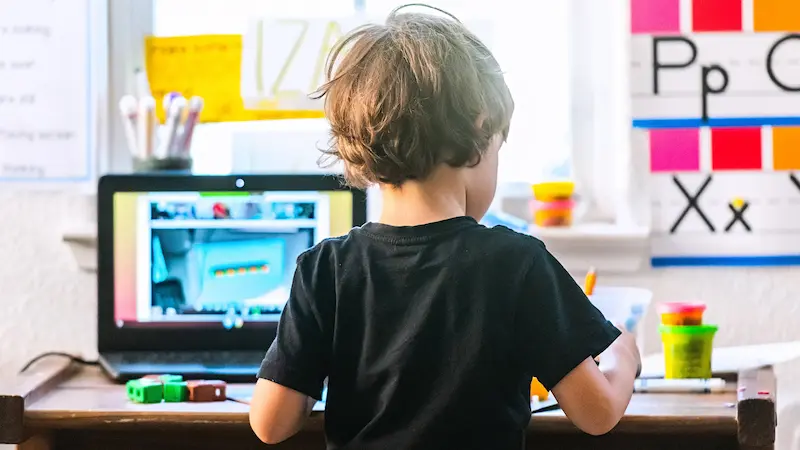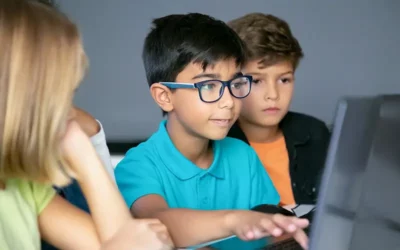In recent years, the landscape of education has undergone a significant transformation with the rise of preschool online learning. The convenience and accessibility offered by digital platforms have led to a surge in parents seeking virtual early education options for their children. This trend has been accelerated by global circumstances, such as the COVID-19 pandemic, which highlighted the need for adaptable educational solutions that can reach children regardless of physical limitations or geographical boundaries.
Early childhood education plays a pivotal role in a child’s development. Quality preschool education sets the foundation for lifelong learning, fostering cognitive, social, and emotional growth crucial for a child’s future success.
Table of contents
- Understanding Preschool Online Learning
- The Landscape of Preschool Online Learning
- The MECE Framework Explained
- Curriculum and Content
- Technology and Platforms
- Teachers and Instructors
- Effectiveness and Outcomes
- Psychological and Social Aspects
- Future of Preschool Online Learning
- Conclusion
- Frequently Asked Questions (FAQ’S)
Understanding Preschool Online Learning
1. Definition and Concept
Preschool online learning refers to the use of digital platforms and tools to deliver educational content tailored for young children. It encompasses interactive activities, videos, games, and lessons designed to engage and educate preschoolers. These platforms often integrate multimedia elements that capture a child’s attention, aiding in the retention and understanding of educational concepts.
2. Advantages and Challenges
The shift to online preschool education offers advantages such as flexibility, accessibility, and a wide array of educational and learning resources. However, challenges like screen time management and ensuring effective learning experiences for young children remain pertinent concerns. Striking a balance between leveraging the benefits of technology and mitigating its potential drawbacks remains an ongoing endeavor for educators and parents alike.
3. Target Audience and Beneficiaries
Preschool online learning caters to children aged 3 to 5 years, providing an accessible educational option for families seeking early learning opportunities. This demographic benefits from the interactive and engaging nature of digital content, which stimulates their curiosity and aids in the development of foundational skills.

The Landscape of Preschool Online Learning
1. Market Overview
The market for preschool online learning has seen exponential growth, with numerous platforms and institutions offering diverse educational programs tailored for young learners. This proliferation has resulted in a wide range of options for parents, allowing them to choose platforms that align with their child’s learning strategies and developmental needs.
2. Prominent Players in the Industry
Key players in the industry include established educational institutions, tech startups, and specialized platforms that provide comprehensive online preschool education. These players often collaborate with experts in early childhood education to develop curricula that encompass both academic and developmental aspects, ensuring a holistic learning experience for children.
The MECE Framework Explained
1. Mutually Exclusive
The MECE framework ensures that categories in a system do not overlap, allowing for clear and distinct classification of information. By organizing information into exclusive categories, educators and developers create structured and easily navigable learning experiences for young children.
2. Collectively Exhaustive
It guarantees that all possible options are covered within defined categories, leaving no gaps or missing elements. This exhaustive approach ensures that the educational content provided comprehensively addresses the various aspects of a child’s development, leaving no critical areas unattended.
Curriculum and Content
1. Core Subjects
Preschool online learning typically covers fundamental subjects such as language development, mathematics, science, and social studies in age-appropriate ways. These subjects form the bedrock of a child’s educational journey and are often presented through engaging stories, interactive games, and visual aids that cater to young learners’ curiosity and cognitive development.
2. Interactive Learning Materials
Engaging activities, videos, games, and interactive tools are employed to make learning enjoyable and effective for young children. The use of multimedia elements fosters an immersive learning experience that captures a child’s attention and facilitates a deeper understanding of concepts.
3. Customization and Adaptation
Platforms often offer customizable learning paths and adaptive content to cater to individual learning styles and pace. This personalization ensures that children receive tailored educational experiences that accommodate their unique strengths and areas needing improvement, fostering a more effective learning journey.
Technology and Platforms
1. Devices and Tools
Preschool online learning utilizes various devices such as computers, tablets, and interactive whiteboards, along with specialized educational apps and software. These tools are designed to create an interactive and engaging learning environment that encourages exploration and active participation.
2. User-Friendly Interfaces
Intuitive and child-friendly interfaces are designed to ensure ease of navigation and engagement for young users. Visual cues, simple layouts, and interactive elements are incorporated to create an accessible platform that encourages independent learning while providing necessary guidance when needed.
3. Safety and Privacy Concerns
Ensuring a secure online environment for children involves robust privacy measures and parental controls to safeguard against potential risks. Platforms prioritize the safety of young users by implementing stringent security protocols and educating parents on best practices for online safety tips for kids.

Teachers and Instructors
1. Role in Online Preschool Learning
Teachers play a vital role in facilitating online learning, providing guidance, feedback, and creating a supportive learning environment. Their role extends beyond imparting knowledge; they act as mentors, fostering curiosity and critical thinking skills in young learners.
2. Qualifications and Training
Qualified instructors undergo specialized training to adapt traditional teaching methods to the online learning environment, emphasizing interactive and engaging strategies. Continuous professional development ensures that educators stay abreast of technological advancements and best practices in online pedagogy, enhancing their effectiveness in teaching young children.
1. Parent as a Partner
Parents play a crucial role as partners in their child’s education, providing support, guidance, and reinforcement of learning outside of formal class hours. Their involvement in a child’s learning journey strengthens the connection between home and school, creating a cohesive educational experience.
2. Monitoring Progress
Regular updates on a child’s progress and involvement in their learning journey empower parents to stay informed and engaged. Feedback mechanisms and progress reports allow parents to track child development and actively participate in identifying areas for improvement or further enrichment.
3. Balancing Screen Time
Maintaining a balance between screen time for educational purposes and other activities is essential for a child’s overall development. Educating parents on strategies to optimize screen time, such as setting boundaries and providing alternative offline activities, fosters a healthy lifestyle and encourages a holistic approach to learning.
Effectiveness and Outcomes
1. Measuring Success
Assessing learning outcomes through evaluations, progress tracking, and qualitative observations helps gauge the effectiveness of preschool online learning. Comprehensive assessment methods encompass not only academic achievements but also the development of social skills, critical thinking, and creativity.
2. Challenges in Assessment
Challenges in accurately assessing young children’s learning progress in an online setting include adapting assessment methods and capturing qualitative aspects of learning. Educators continually explore innovative evaluation techniques that encompass the multifaceted nature of a child’s growth and development beyond traditional metrics.
Psychological and Social Aspects
1. Social Development
Strategies are implemented to foster social skills, peer interaction, and emotional development in an online learning environment. Collaborative activities, group projects, and virtual interactions simulate social scenarios, providing children with opportunities to develop empathy, communication, and teamwork skills.
2. Screen Time Impact on Children
Understanding and managing the effects of screen time on a child’s well-being and development remain important considerations. Educators and parents collaborate to implement strategies that mitigate potential negative impacts, emphasizing the importance of breaks, outdoor activities, and varied learning experiences beyond screens.
3. The Role of Play
Integrating playful learning experiences aids in holistic development, stimulating creativity, and problem-solving skills in young learners. Play-based learning activities are incorporated into online platforms, providing opportunities for children to explore, experiment, and learn through hands-on experiences.
Future of Preschool Online Learning
1. Technological Advancements
Anticipated advancements in technology will likely further enhance the interactivity and effectiveness of online preschool education. Innovations in augmented reality, artificial intelligence, and adaptive learning algorithms will offer personalized and immersive learning experiences tailored to individual needs.
2. Potential Challenges and Solutions
Foreseeing challenges such as equitable access and the digital divide, proactive measures can be taken to address these issues and ensure inclusivity. Collaborative efforts between governments, educational institutions, and technology providers aim to bridge the gap and provide equal opportunities for all children to access quality education.
3. Shaping the Next Generation of Learners
Preschool online learning will continue to evolve, shaping a generation of tech-savvy, adaptable, and lifelong learners. By nurturing curiosity, critical thinking, and digital literacy from an early age, online education contributes to molding individuals equipped to navigate an ever-changing global landscape.
Conclusion
The landscape of preschool education has undoubtedly expanded with the integration of online learning. Embracing this shift while acknowledging its challenges empowers parents, educators, and stakeholders to maximize the benefits of digital platforms for the holistic development of young learners. As technology continues to advance, the future of preschool online learning holds immense promise in shaping the educational journey of the next generation.
Preschool online learning is not just a trend; it’s a dynamic and evolving avenue that holds immense potential to create a strong educational foundation for children worldwide. Its multifaceted approach, blending technology with pedagogical expertise, ensures that young learners are equipped with the skills, knowledge, and adaptability necessary to thrive in an increasingly interconnected and digital world.
To get your hands on more educational and free resources on coding for kids, robotics for kids, financial education for kids, etc., do check out the BrightCHAMPS Page now!
Frequently Asked Questions (FAQ’S)
A1. Preschool online learning refers to educational programs designed for young children, typically between the ages of 3 to 5, delivered through digital platforms. These programs aim to facilitate early childhood education through interactive activities, games, videos, and lessons, fostering cognitive, social, and emotional development.
A2. Online preschool learning can be effective when well-designed and properly implemented. However, it may lack some aspects of traditional preschool, such as hands-on experiences and social interactions. Effective online programs often incorporate engaging activities, qualified instructors, and parental involvement to ensure a balanced learning experience.
A3. Consider factors such as the curriculum quality, teacher qualifications, interactive features, parent involvement opportunities, flexibility, cost, and reviews from other parents. Look for programs that align with your child’s learning style and developmental needs while providing a supportive environment.
A4. Age requirements for online preschool programs can vary, but they often cater to children between the ages of 3 to 5, corresponding to the typical preschool age range. Some programs might have specific age criteria for enrollment, so it’s essential to check the individual program’s guidelines.
A5. Generally, you’ll need a device like a computer, tablet, or smartphone with a stable internet connection. Specific requirements can vary based on the program, but many online preschool platforms can be accessed through web browsers or dedicated apps. Additionally, some programs may recommend headphones, a webcam, or specific software for optimal participation.


 We are an army of educators and passionate learners from BrightChamps family, committed to providing free learning resources to kids, parents & students.
We are an army of educators and passionate learners from BrightChamps family, committed to providing free learning resources to kids, parents & students.












